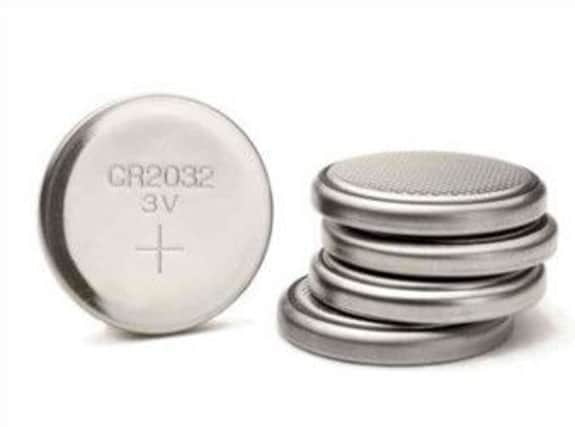Warning: Lithium batteries can kill


With so many families using batteries for toys this Christmas, parents need to be aware that Lithium batteries can be found in many items in your home.
They are used to power remote controls, toys, musical greeting cards, calculators, watches, keys and other electronics. Small children can often have easy access to these devices as people are not aware of the risk the lithium batteries can have.
Advertisement
Hide AdAdvertisement
Hide AdDavid Adams, Home Safety Officer for Coleraine, Ballymoney and Moyle Borough Councils commented on the dangers: “Lithium batteries are more frequently causing injuries and death in children aged between 12 months to six years old.
“When swallowed the battery creates an electrical current, and that current causes a buildup of sodium hydroxide the common name of which is caustic soda. The caustic soda burns through the esophagus and continues on to burn through major blood vessels leading to catastrophic internal bleeding.
“Even after removal, if enough sodium hydroxide has built up the burning will continue causing death anything up to a week later. These small batteries don’t have to be broken, chewed or damaged in any way to cause death from internal bleeding.”
The Royal Society for the Prevention of Accidents warn that Lithium batteries react with saliva and consequently can leak acid and cause severe trauma within as little as one hour.
Advertisement
Hide AdAdvertisement
Hide AdThey advise: “If your child swallows a button cell battery, seek medical advice immediatelyRemember that the saliva in their body will react with the battery and so time is very much of the essence in these cases.”
Following this information advice is to remove any items which contain lithium batteries from the reach of babies and young children, and also updating your baby-proofing measures with battery dangers in mind.
Additional advice to remember: Keep coin lithium battery-controlled devices out of sight and reach of children. Examples of such devices include remote controls, singing greeting cards, digital scales, watches, hearing aids and thermometers; Keep loose batteries locked away, or place a piece of duct tape over the controller to prevent small children from accessing the battery; Share this life-saving information with friends and family members. It only takes a minute and it could save a life; and if you suspect your child has ingested a battery, go to the hospital immediately. Don’t induce vomiting or have your child eat or drink anything until assessed by a medical professional.